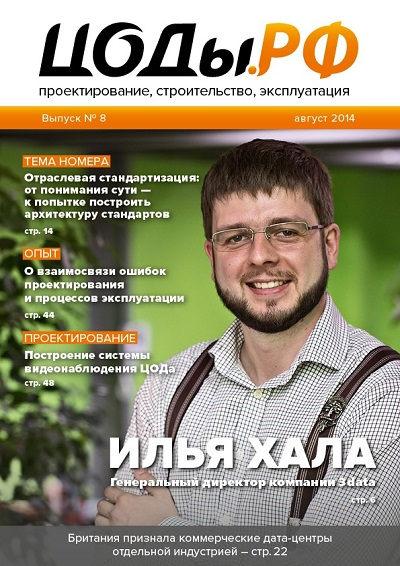The eighth issue of the magazine TsODy.RF
 In the field of building data centers in Russia, things are not so bad. Today, our country can boast of large and high-quality data centers, in many ways not inferior to foreign objects. Our experts have already learned how to build well separate data centers. But is the industry as a whole ready for the massive deployment of high-quality, that is, properly constructed facilities? The answer to this question leads directly to the topic of standardization.
In the field of building data centers in Russia, things are not so bad. Today, our country can boast of large and high-quality data centers, in many ways not inferior to foreign objects. Our experts have already learned how to build well separate data centers. But is the industry as a whole ready for the massive deployment of high-quality, that is, properly constructed facilities? The answer to this question leads directly to the topic of standardization.At first glance, the discussion of issues of standardization of any kind of industry is a most interesting lesson. Nevertheless, it was precisely standardization that became the topic of the August issue of the journal “Data Centers. RF ". The reason for this is an acute need for industry standards, which is recognized by many participants in the data center market. After all, it is no secret that the industry is experiencing problems with the domestic base of standardization of data processing centers: it is not yet slim, it has serious gaps. But the existing foreign standards are not a panacea either - for a number of reasons that require separate consideration.
Why is the formation of standards so important? Paradoxically, any system can not develop in the absence of restrictions. And the standards just outline the range of restrictions, the absence of which becomes a barrier that does not allow building and operating a data center properly. Without this criterion, it is impossible to conduct an audit, to give an objective assessment of the quality of the project, the facility itself or the processes organized in it.
Experts see all the signs that the data center market in Russia is currently moving to a new important stage in its development. Its key element will be the formation of a system of standards that will significantly transform many aspects of various activities related to the creation and operation of high-quality sites. The formation of a system of domestic standards in the market of data centers is overseen by the Association of Industry Data Centers.
')
What do industry participants expect from standards? Obviously, unification, coordination, streamlining, ensuring mutual compliance of processes, and at all five stages of the data center life cycle: at the stage of pre-design preparation, design, construction, operation, utilization.
The problem is that if at some of the initial stages a certain defect in quality issues is allowed, then a multiplicative effect is possible, when at subsequent stages mistakes, shortcomings or even failures cannot be leveled as a future solution. And if irreproachable functioning is put at the forefront on the finished object, then it entirely depends on the quality of the performance of work and the execution of processes at all previous stages, up to the formation of requirements for the future object.
And one more thing worth noting: the introduction of a quality management system, which is confirmed by a beautiful certificate in a frame under glass in the office of the data center management, is not a guarantee of quality. It is known, for example, that a good team of data center specialists is able to ensure reliability and efficiency regardless of the availability of certificates or plans to obtain them. A bad case, no frames will not help.
Having a true idea of the compliance of an object with any standards often poses a big problem. You can talk a lot about the quality of design, construction or operation, but always the question arises: how to independently assess that a particular project, object or process is performed qualitatively? The current issue of the journal contains many useful materials that will provide answers to these and other questions. And practical advice and examples of the implementation of specific tasks on real objects will replenish the reader's best practices piggy bank. And note that for this you do not need to become a member of some closed club and pay fees - just read the magazine "TSODY.RF."
Natalya Zhilkina, Chief Editor
The full contents of the issue you can find on the site TsODy.RF №8
Source: https://habr.com/ru/post/235437/
All Articles